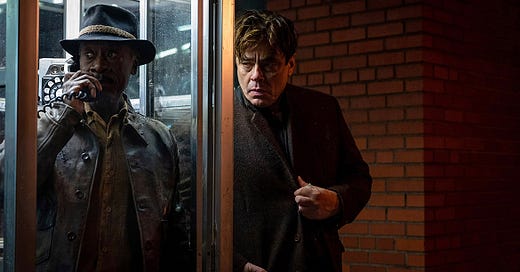No Sudden Move
Reviewer Alec Toombs prefers his Steven Soderbergh cool as opposed to cold and HBO Max's "No Sudden Move" is frigid.
Steven Soderbergh was arguably one of our best and most prolific directors prior to his “retirement” in 2013. (During which he made 20 episodes of Cinemax’s “The Knick” – this dude was like Michael Jordan in a White Sox jersey.) Soderbergh returned to filmmaking in 2017 with the fun and frivolous but ultimately inconsequential “Logan Lucky.” He’s subsequently directed “Unsane,” “High Flying Bird,” “The Laundromat” and “Let Them All Talk” … most of which have debuted on streaming services and only some of which I’ve seen.
In my humble opinion Soderbergh’s most creatively fertile period was between 1998 (when he released “Out of Sight,” which is my favorite flick of his) and 2001 (which saw the release of his “Ocean’s 11” remake … his most commercially viable work to date). In between Soderbergh made the bitchin’ Terence Stamp/Peter Fonda crime picture “The Limey” (1999), directed Julia Roberts to an Oscar in “Erin Brockovich” (2000) and performed the same service for Benicio Del Toro later that year with “Traffic.”
Soderbergh has often been known as a “one for them, one for me” filmmaker. I’m of the opinion that generally speaking his creative output is actually stronger when he’s making one for them. I incorrectly assumed that his latest effort “No Sudden Move” (now streaming on HBO Max) would be one for them with its starry cast (Don Cheadle, Del Toro, David Harbour, Jon Hamm, Amy Seimetz, Brendan Fraser, Kieran Culkin, Noah Jupe, Julia Fox, Ray Liotta and Bill Duke) and crime caper premise, but this is most assuredly one for him. This feels less like “Out of Sight” and more akin to something like “Bubble.”
It’s 1954 in Detroit. A trio of criminals – Curt Goynes (Cheadle), Ronald Russo (Del Toro) and Charley (Culkin) – are commissioned by middle man Doug Jones (Fraser – it’s kinda funny to see a chubby dude playing a cat with a skinny dude’s name) to hold a family of four (Harbour, Seimetz, Jupe and Lucy Holt) hostage. Harbour’s patriarch Matt Wertz is an accountant for Chrysler who has access to safe-bound plans for the not-yet-employed catalytic converter. If Wertz provides the criminals with the plans he and his family will emerge unscathed.
Complicating matters is the suspicion that this job is a setup. Black crime boss Aldrick Watkins (Duke) is angry at Goynes for botching a previous job. White crime boss Frank Capelli (Liotta) justifiably suspects that Russo is sleeping with his wife Vanessa (Fox). Law enforcement officer Joe Finney (Hamm) is investigating not only the criminals but Wertz himself. Pulling all the strings for his own benefit is an auto industry executive played by an uncredited BIG name Soderbergh regular.
I wanted so very much to dig “No Sudden Move” and to a certain extent I do. It’s handsomely made and well-acted. The script by “Bill & Ted” and “Men in Black” screenwriter Ed Solomon tackles details macro (the treatment of African Americans in 1950s Detroit and America as a whole, the auto industry’s lack of concern for our environment) and micro (naming Cheadle’s character Goynes seems like a cool tip of the cap to late Detroit-based urban fiction author Donald Goines). I just wish Solomon had injected some heart into the proceedings and made more of the characters likable/worth rooting for, but that’s not the story he and Soderbergh chose to tell. Almost all of these folks are underdeveloped or scumbags save for Cheadle’s Goynes and Jupe’s Matthew Wertz Jr. Cheadle is the clear-cut standout acting-wise. A quiet scene between Goynes, a woman from his past named Clarisse (Lauren LaStrada) and her new man Rudy (Wallace Bridges) in which he’s attempting to retrieve a suitcase is easily its best by saying everything and telling nothing.
Soderbergh shot the film under his usual pseudonym Peter Andrews using modern cameras and antique lenses often resulting in an interesting fisheye effect. The camera’s fluid movements occasionally call to mind the works of both Max Ophüls and Douglas Sirk. The movie often moves (it’s somewhat glacially-paced) and feels like it was made in the ‘50s save for some terse language and a few graphic depictions of violence.
I prefer my Soderbergh cool as opposed to cold. “No Sudden Move” is frigid, but I suspect it might warm up on a rewatch.





